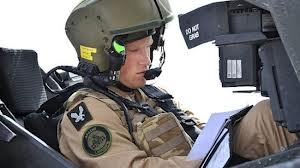 London, Jan 25: Upon returning from his five-month tour of duty in Afghanistan's southern Helmand Province, the third in line to the British throne, Prince Harry, says he killed Muslims to protect his people.
London, Jan 25: Upon returning from his five-month tour of duty in Afghanistan's southern Helmand Province, the third in line to the British throne, Prince Harry, says he killed Muslims to protect his people.
“Take a life to save a life, that's what we revolve around,” Harry said.
It is not clear how many people Prince Harry has killed during the Helmand tour, but he has confirmed responsibility for killings.
“If there's people trying to do bad stuff to our guys, then we'll take them out of the game,” he said.
Prince Harry, who served as co-pilot gunner, compared killing people from an Apache helicopter to playing video games and described his job as a “joy.”
“It's a joy for me because I'm one of those people that loves playing PlayStation and Xbox, so with my thumbs I like to think I'm probably quite useful,” he said.
The 28-year-old prince was deployed to serve a 20-week mission with NATO forces in Afghanistan shortly after his scandalous nude pictures at a hotel in Las Vegas were published on the Internet, making headlines worldwide.
According to the website icasualties.org, a total of 3,257 US-led troops have lost their lives in Afghanistan since 2001, when the United States and its allies invaded Afghanistan as part of Washington's so-called war on terror.
The offensive removed the Taliban from power, but insecurity continues to rise across the country, despite the presence of thousands of US-led troops.
Hundreds of foreign soldiers were killed in the war-torn country in 2012 alone.





Comments
Add new comment